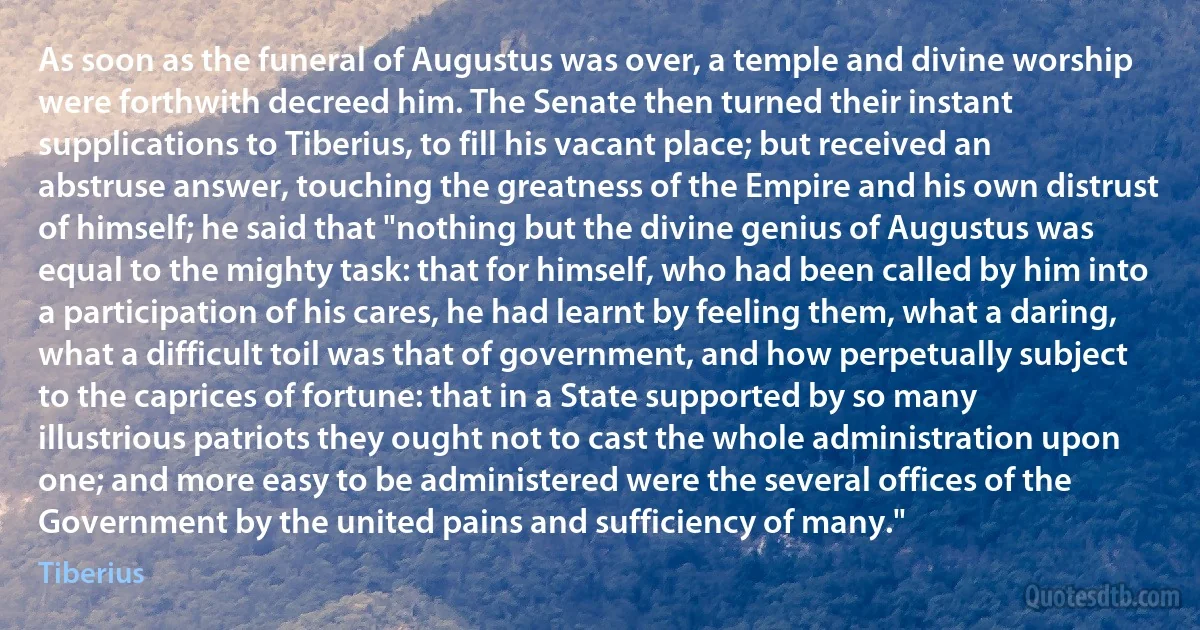
As soon as the funeral of Augustus was over, a temple and divine worship were forthwith decreed him. The Senate then turned their instant supplications to Tiberius, to fill his vacant place; but received an abstruse answer, touching the greatness of the Empire and his own distrust of himself; he said that "nothing but the divine genius of Augustus was equal to the mighty task: that for himself, who had been called by him into a participation of his cares, he had learnt by feeling them, what a daring, what a difficult toil was that of government, and how perpetually subject to the caprices of fortune: that in a State supported by so many illustrious patriots they ought not to cast the whole administration upon one; and more easy to be administered were the several offices of the Government by the united pains and sufficiency of many."
TiberiusRelated topics
administration answer cast divine easy equal fill fortune funeral genius government greatness learn mighty nothing ought pains participation place say senate state task worship AugustusRelated quotes
When Gallienus received the intelligence that his capital was delivered from the barbarians, he was much less delighted than alarmed with the courage of the senate, since it might one day prompt them to rescue the public from domestic tyranny as well as from foreign invasion. His timid ingratitude was published to his subjects, in an edict which prohibited the senators from exercising any military employment, and even from approaching the camps of the legions. But his fears were groundless. The rich and luxurious nobles, sinking into their natural character, accepted, as a favor, this disgraceful exemption from military service; and as long as they were indulged in the enjoyment of their baths, their theatres, and their villas, they cheerfully resigned the more dangerous cares of empire to the rough hands of peasants and soldiers.

Edward Gibbon
National weakness - real or perceived - can tempt aggression and thus cause war. That's why the United States cannot neglect its military strength. We must and we will remain strong. But with equal determination, the United States and all countries must find ways to control and reduce the horrifying danger that is posed by the world's enormous stockpiles of nuclear arms.
This has been a concern of every American president since the moment we first saw what these weapons could do. Our leaders will require our understanding and our support as they grapple with this difficult but crucial challenge. There is no disagreement on the goals or the basic approach to controlling this enormous destructive force. The answer lies not just in the attitudes or actions of world leaders, but in the concern and demands of all of us as we continue our struggle to preserve the peace.

Jimmy Carter
Difficult as the course is, the dangers do not come from the difficulties; they come from extremists in India and at home. I will tell you what I mean. I am firmly convinced that such writings as appear in such papers as the Daily Mail will do more to lose India for the British Empire, will do more to cause a revolutionary spirit, than anything that can be done in any way by anyone else. I got many letters, I need hardly say, of all points of view. I had a very characteristic one last week... It was from a colonel; he was an old man, you could tell that by his writing; and he used this phrase: He said, "You and Lord Irwin are negrophiles." Perhaps he was a member of the United Empire party. That is not the way to cement the Empire. This sort of thing, and the spirit behind it, will break up our Empire infallibly, and that is what I am out to fight.

Stanley Baldwin
Every measurable thing except numbers is imagined in the manner of a continuous quantity. Therefore, for the mensuration of such a thing, it is necessary that points, lines, and surfaces, or their properties, be imagined. For in them... measure or ratio is initially found... Therefore, every intensity which can be acquired successively ought to be imagined by a straight line perpendicularly erected on some point of the space or subject of the intensible thing, e. g., a quality... And since the quantity or ratio of lines is better known and is more readily conceived by us-nay the line is in the first species of continua, therefore such intensity ought to be imagined by lines... Therefore, equal intensities are designated by equal lines, a double intensity by a double line, and always in the same way if one proceeds proportionally.

Nicole Oresme
If it was possible for men who exercise their reason, to believe that the divine Author of our existence intended a part of the human race to hold an absolute property in, and an unbounded power over others, marked out by his infinite goodness and wisdom, as the objects of a legal domination never rightfully resistible, however severe and oppressive, the inhabitants of these Colonies might at least require from the Parliament of Great Britain some evidence, that this dreadful authority over them has been granted to that body. But a reverence for our great Creator, principles of humanity, and the dictates of common sense, must convince all those who reflect upon the subject, that Government was instituted to promote the welfare of mankind, and ought to be administered for the attainment of that end.

John Dickinson (delegate)
